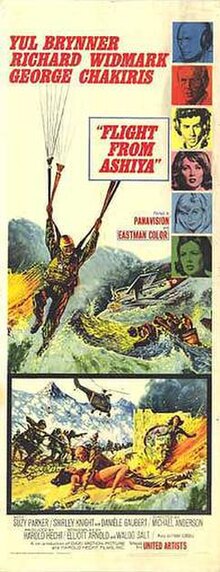Flight from Ashiya
| Flight from Ashiya | |
|---|---|

|
|
| Directed by | Michael Anderson |
| Produced by | Harold Hecht |
| Written by |
Elliott Arnold (novel) Waldo Salt |
| Starring |
Yul Brynner Richard Widmark George Chakiris Suzy Parker Shirley Knight Danièle Gaubert Eiko Taki Joseph Di Reda Mitsuhiro Sugiyama E.S. Ince Andrew Hughes |
| Music by | Frank Cordell |
| Cinematography |
Joseph MacDonald, ASC Burnett Guffey, ASC |
| Edited by | Gordon Pilkington |
|
Production
company |
|
| Distributed by | United Artists |
|
Release date
|
March 25, 1964 (U.S. release) |
|
Running time
|
100 mins. |
| Language | English |
| Budget | $1.8 million |
Flight from Ashiya is a 1964 film about the U.S. Air Force's Air Rescue Service, flying out of Ashiya Air Base, Japan. In this fictionalized film set in the early 1960s, a flight crew's mission is to rescue a liferaft of Japanese civilians stranded in rough seas. It was based on the 1959 novel by Elliott Arnold.
The movie centers on three flight crew members of a USAF Air Rescue Service HU-16 Albatross and various experiences in their collective pasts, told in flashback. Some have considered the flashbacks as tedious and boring, but the aircraft sequences are generally considered quite good, especially for fans of the Grumman Albatross. Richard Widmark plays Colonel Stevenson (the pilot in command); Yul Brynner portrays Master Sergeant Mike Takashima (the Pararescue specialist) and George Chakiris portrays the co-pilot, Lieutenant Gregg.
MSgt Mike Takashima, Col Glenn Stevenson, and 1st Lt John Gregg, all members of the U. S. Air Force Air Rescue Service at Ashiya Air Base, Japan, set out to rescue the survivors of a Japanese ship wrecked in a still-raging storm. As they fly to the site of the wreck, each man recalls a part of his past: Gregg remembers the avalanche caused in Europe when his H-19 Chickasaw helicopter came too close to a mountain. The avalanche subsequently buried alive the group of people whom he was attempting to rescue. The accident has since caused him to fear flying solo. Stevenson, deeply prejudiced against the Japanese, recalls the reason for his hatred: as a civilian pilot in the Philippines prior to World War II, he met and married Caroline Gordon. She and their infant son later died in a Japanese prison camp when they were refused medical supplies which were being saved for Japanese soldiers. Takashima, half-Polish (mother), half-Japanese (father), reminisces about his tragic love affair with Leila, an Algerian girl, when he was an Army paratrooper during World War II. He was unable to stop the blowing up of a bridge where Leila had run to look for him after learning that his unit was being withdrawn from town. Stevenson, Gregg and Takashima are the crew of the lead aircraft of a flight of two HU-16s dispatched to rescue the Japanese civilians at sea. When one HU-16 air rescue plane crashes while attempting to land in the treacherous seas, Stevenson refuses to jeopardize his plane for Japanese lives. At the last minute, however, he recalls Caroline's dying plea not to hate; he overcomes his prejudice. Takashima volunteered to parachute to the life rafts with rescue equipment. Stevenson and Gregg then land the plane at sea and rescue the survivors, but when Stevenson is injured in the landing, Gregg is forced to overcome his fear and handle the dangerous takeoff and the flight back to Ashiya.
...
Wikipedia
